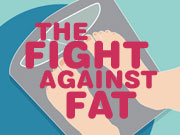|
Audio
Photos
More from MPR
Your Voice
|
Weighing the risks of gastric bypass surgery
April 11, 2004
 |
| Gail Hocking has lost 140 pounds since she had gastric bypass surgery in spring 2003. The photo on the left was taken a few weeks before the surgery. The one on the right was taken about a year after the procedure. Hocking says the operation changed her life. (MPR Photos/Tom Robertson) |
Bemidji, Minn. — Gail Hocking is getting something she hasn't had in years --exercise. On this day, she's plods away on a treadmill at the community fitness center on the Red Lake Indian Reservation. A year ago, it was the last place you'd have found Hocking. Back then, Hocking would get winded walking just a few steps. "I would just get so exhausted so fast, that, forget it," said Hocking. "Exercise was not something I even took into consideration."
As a teenager, she weighed 250 pounds. Last year, at age 54, she was approached 400 pounds. Hocking had high blood pressure and her knees were giving out. Doctors told her if she didn't lose weight, she'd soon be in a wheelchair.
 | |||
That's when Hocking decided to have gastric bypass surgery. The procedure bypassed part of her small intestine. Doctors sectioned off her stomach into a small pouch, which now holds only about a cup of food. Since the surgery, she's lost about 140 pounds.
"It's been a lifesaving surgery for me," she said. "I truly believe that. At the rate I was going, I wouldn't have been around long."
Gastric bypass is considered a last-ditch solution to combat severe obesity. And it's growing in popularity. The number of surgeries performed in the U.S. has more than doubled in the past few years. But the procedure is risky. One in five patients will endure side effects ranging from vomiting and hernias, to potentially fatal blood clots or infections.
Hocking suffers from bad bouts of diarrhea, which is also common for someone who's had a gastric bypass. It happens when she eats sugar, because her body can't digest it anymore.
And she experiences other side effects. On this day at the Red Lake Fitness Center, after she switched over to a rowing machine, Hocking abruptly stops her workout. She breaks out in a sweat and her face has turned pale.
 | |||
Hocking calls out for help to the fitness center staff. Looking weak and shaky, she asks for a piece of candy, or something sweet. The symptoms are similar to a diabetic reaction. Someone helps Hocking into an office and pokes her finger to test her blood sugar count. The test indicates it's very low.
These moments of low blood sugar happen to Hocking about once a week.
"I only passed out once," she said. "I wasn't driving, thank God."
Many people in Hocking's family have diabetes. It's rampant in Indian communities. But she doesn't have the disease. She says her low sugar reaction is the result of her surgery. Her body isn't absorbing as many nutrients. Because her stomach is so small, she only eats about three cups of food a day.
Not being able to eat what she wants has been the toughest part since the surgery. Hocking loves to eat. She ate when she was happy and when she was sad. Hocking realized she had an unhealthy relationship with food. And it was slowly killing her.
|
It was hard not to sit down and have a big old helping of meat and potatoes... It's like with a drug addiction, you know. Your mind is made up it's something you have to give up. Well, you give it up, if you want to keep on living.
- Gail Hocking |
"It was hard not to sit down and have a big old helping of meat and potatoes," Hocking said. "But it's something I knew I had to do, so I just told myself you don't have a choice, you've got to. It's like with a drug addiction, you know. Your mind is made up it's something you have to give up. Well, you give it up, if you want to keep on living."
Hocking's life has completely changed since her weight loss. She no longer has to special-order large size clothes. She doesn't have to ride an electric cart at the grocery store. She's able to go for walks with her grandkids.
Her immediate goal is to get her weight under 200 pounds. She has about 30 more to go. Beyond that, she's not sure.
"I guess we'll just have to wait and see what happens," Hocking said. "I would like to get down to, say, 150 pounds. But to me that's not realistic. You know, who knows? Only God."
Studies show gastric bypass surgery can help severely obese people live longer. But there are still lots of unanswered questions. There have been few studies done of the long term effects. Several such studies are underway now.
In the meantime, the American Medical Association is advising surgeons not to overestimate the procedure's benefits.
|
News Headlines
|
Related Subjects
|

